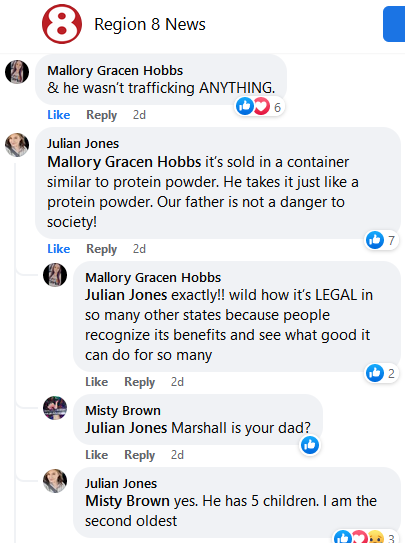
On November 16, Greene County Circuit Court in Arkansas sentenced a man to 10 years in prison for carrying kratom.
Arkansas classified kratom a Schedule 1 substance in 2015, making it just as illegal as heroin, methamphetamine, and cocaine.
In 2021, Greene County police pulled over Marshall Ray Price, 46. Police claim Price was driving with broken tail lights. They also claim Price gave consent to search the vehicle. The search, according to court documents, turned up “in excess of 200 grams” of kratom, which classifies the charge as felony trafficking in Arkansas.
Two hundred grams (about 7 ounces), may be a 1-2 month supply for a moderate kratom consumer.
Price’s family claims the kratom was for personal use only. In Facebook comments on the story by Region 8 News, Price’s daughter Mallory Gracen Hobbs posted, “he never deserved 10 years for simple possession of a tea plant.. He definitely wasn’t trafficking it like they’re saying…he had two small packages, maybe four doses worth. It should’ve been a simple possession charge, my dad isn’t a drug trafficker ![]() this medicine helped my dad get off and stay off heroin”.
this medicine helped my dad get off and stay off heroin”.
Julian Jones, also Price’s daughter, added, “He takes it just like a protein powder. Our father is not a danger to society!”

Arkansas court records show Price had prior convictions for possession of controlled substances, including non-prescription Suboxone and marijuana, and failure to make child support payments.
The sentencing order shows Price has no prior domestic violence or sex offense charges, yet the jury recommended 120 months in prison, 2 years longer than the minimum 96 months. Circuit Judge Randy Philhours agreed.
Nora Volkow, Director of National Institute on Drug Abuse (NIDA), wrote in 2021:
Drug use continues to be penalized, despite the fact that punishment does not ameliorate substance use disorders or related problems. One analysis by the Pew Charitable Trusts found no statistically significant relationship between state drug imprisonment rates and three indicators of state drug problems: self-reported drug use, drug overdose deaths, and drug arrests.
In this case, the jury also found Price guilty of driving on a suspended license. The jury found him not guilty of driving with defective/improper tail lamps, calling into question the reason police gave for the stop.
A motion by the defense suggests there is some question as to whether Price truly gave consent to a vehicle search. Public defender James Scurlock filed a motion to suppress evidence, namely “objects to the use of any evidence by the State of Arkansas which the Court finds was illegally obtained” by “an unlawful search and seizure” and “Property seized as a result of an invalid warrant or a warrant unsupported by probable cause”.
A motion filed by the State sought to restrict testimony that Price bought kratom legally in Missouri. According to the prosecution:
any attempt to introduce evidence through testimony or other means would be for the sole purpose of attempting to mitigate the criminality of the Defendant’s conduct by asserting that since it is a legal drug just up the road, he is less culpable or less guilty, or should have the pity of the jury
Prosecuting Attorney Keith Chrestman put out a press release received by KAIT8 celebrating his victory. “Our communities won’t tolerate drug trafficking,” Chrestman said. He also praised fellow prosecutors on the case Wesley Watts and Alexia Butler “for their hard work and willingness to serve.”
Chrestman also made news in 2022 for trying to block the West Memphis Three from introducing DNA evidence into their famous case. A jury convicted three teenagers in West Memphis, Arkansas of the 1993 murders of three young boys based on very flimsy evidence, other than the fact that they liked to wear heavy metal T-shirts and faced coercive interrogations by police. The documentary Paradise Lost gained critical acclaim and support from famous musicians and actors for the three teens.
In 2011, [the West Memphis Three] were released from prison as part of an agreement known as an Alford Plea. Under the plea, Echols, Baldwin and Misskelley maintained their innocence but pleaded guilty in exchange for an 18-year sentence, plus time served.
They’ve since been trying to clear their names. The latest effort is focused on advanced forensic testing of some remaining evidence from the crime scene.
In his filing on Tuesday, Chrestman wrote that a judge will have the final say regarding Echols’ petition.
“We must follow the law,” wrote Chrestman. “And under the law, the Court — not a prosecuting attorney — determines whether seized evidence in a closed case can undergo further DNA testing.”
But Chrestman was obviously arguing against it.
https://www.arkansasonline.com/news/2022/feb/09/prosecutor-wants-court-to-deny-new-dna-testing-in/
Bethany Cook left her home state of Arkansas after the state criminalized her for consuming the tea.
“I have been diagnosed with a lot of painful medical conditions and became addicted to opioids, so I cannot take them,” she told Kratom Science in 2019. “When Arkansas banned kratom they left me no choice but to go back to opioids to be able to work and I wound up addicted again. I tried and tried to control it and just couldn’t. After about a year or so back on opioids I got tired of them again and moved to Mississippi so that I could take my kratom and get back off of them.”
In 2015, the Arkansas Department of Health (ADH) placed kratom on the state’s controlled substances list after receiving a single notification from Dr. Thomas Atkinson from Springdale who said he had treated some patients at his facility for kratom dependency.
According to ADH’s amendment proposal, “A public hearing was held on September 1, 2015. The Public Comment period expired on September 1, 2015. The Department did not receive any public comments.”
###
